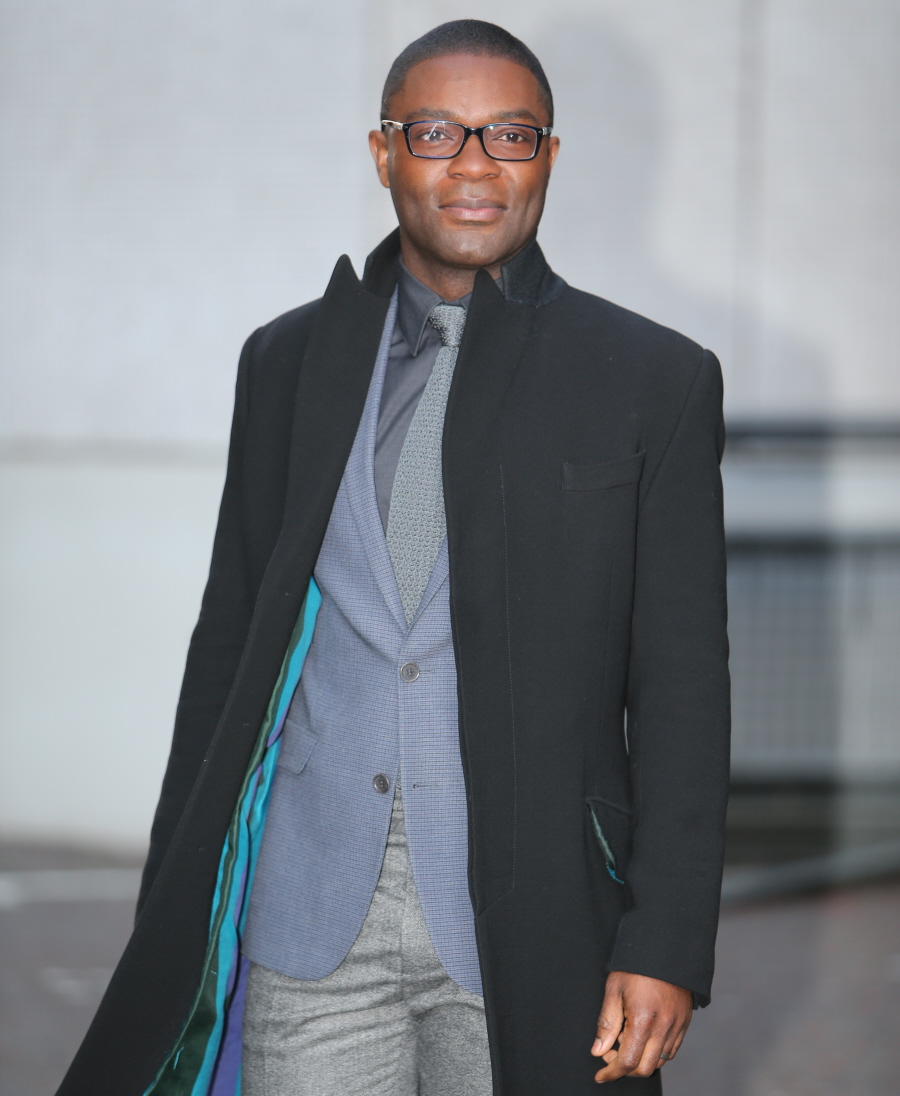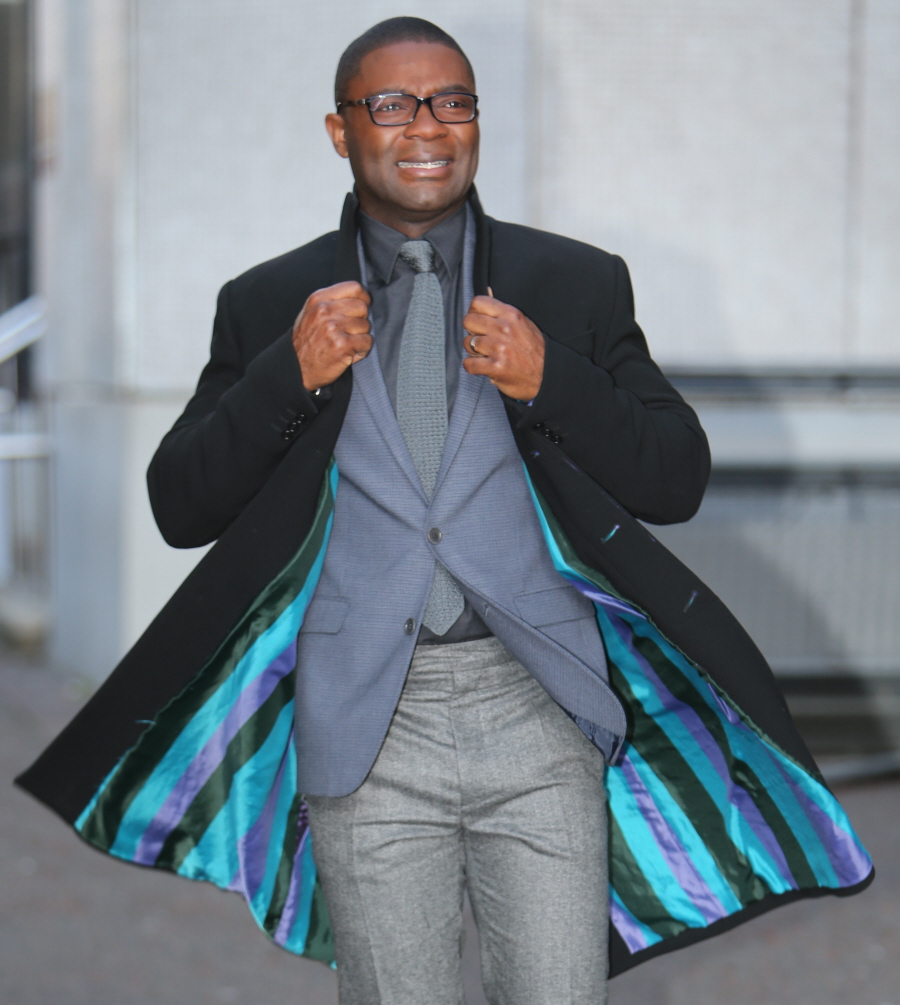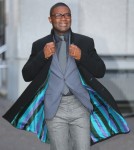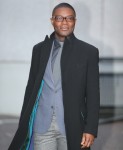Here are some photos of David Oyelowo outside of the ITV Studio a few days ago in London. He was promoting Selma in Britain – it was just released there on Friday. As I keep saying, I loved Selma, flaws and all. I thought Oyelowo was a revelation as Martin Luther King Jr. and I didn’t have a problem with some of the historical liberties taken by the script. Oyelowo’s MLK was brilliant because we got to see Dr. King not as an untouchable, towering and “safe” icon. We saw him as an exhausted and “dangerous” revolutionary who made mistakes, fought with his wife and at times struggled with the miniscule progress being made. Which is just as Oyelowo wanted for his portrayal. Oyelowo spoke to The Guardian about the film, and let me just say… David Oyelowo all day long. I’d much rather hear him talk about race (as opposed to Bendy). You can read the full piece here. Some highlights:
The portrait of Dr. King in ‘Selma’: “If all we showed was Dr King giving speeches and leading marches, we would basically be making a case for going to watch a good documentary… What we usually do to great men and women is relegate them to homogenised heroism. Their words and actions become soundbites and images in a way that gives us an excuse not to act bravely in our own lives. We might look at King and think, ‘Well, I’m not him. I didn’t say ‘I have a dream.’ But to see yourself in them makes it possible that you’ll be stirred towards becoming the greatest version of yourself. We all take out the bins or sit around in our dressing gowns. To put someone on a pedestal renders them untouchable – and subhuman. It gives us an excuse not to act as they did.”
Colorblind casting: “When I looked to heroes I wanted to emulate, I constantly found myself mentally jumping over the pond. I had read that Denzel Washington had told his agent early on: ‘Give me everything that Harrison Ford is turning down.’ That stuck with me…The only way I get a leading role in a studio picture is if Ryan Gosling can’t play it, which is clearly the case with Selma. If this was a non-colour-specific character, it wouldn’t be me. It just wouldn’t.”
The problem of only black artists talking about race: “It’s because films like Selma are so rarely made that we end up putting them under the microscope. One, maybe two, a year. As a white person, you don’t have that. You have the gamut. No one says to Oliver Stone: ‘Another film about Vietnam? White characters again?’ Benedict Cumberbatch is never asked, ‘What, you’re playing another historical character?’”
Defending Benedict Cumberbatch: “Everyone has ended up ignoring the issue Benedict was talking about and focusing on that one word. It’s actually stopped us talking about race. Look, Benedict is a good friend. He was simply expressing, as someone who has no dog in the fight, that his friends are getting better opportunities in the US than here. That’s something worth examining. Instead, we get hung up on terminology.”
The N-word: “I must say I hate the N-word, particularly when black people use it about themselves. It’s like chitlins: the offal that was a delicacy for slaves. It’s the small intestine of a pig. People get so used to eating something substandard that in order to survive they have to take ownership of it. But it doesn’t change the fact that it’s still the most disgusting part of the animal!” He’s raising his voice now for the first time during our conversation. “Just because you’ve reappropriated it, that doesn’t detoxify it. That’s how I feel about the N-word.”
He talks about God a great deal and how his faith has always been important to him, and how God told him he would play MLK in Selma. It’s nice that he took another opportunity to defend Benedict too, which David also did at the Selma premiere. David riffed on language for a while during that part of the interview, talking about his four children and how they’re mixed-race (his wife Jessica is white). He said he recently had a moment of panic when he referred to his kids as “biracial” and thought “Is that what we’re saying? Is it ‘biracial’ or ‘mixed race’? Do I love my kids any less if I use one or the other?” I think both are pretty acceptable? I prefer mixed race.
Photos courtesy of WENN.


















I agree completely with his view on the word. I grew up being taught the same thing that using it as black people doesnt “take back” the painful history behind it. Ive grown to understand how people who grew up differently may feel otherwise but I dont really understand that concept in general – the taking back of words such as f*g. I dont really get as offended anymore when I hear it as long as the people around me dont call me that, Im good.
In other news, I’ve been watching Ava Duvernay’s interviews and she’s super charismatic and its interesting to hear her story. Im really interested in her Katrina movie when it comes out!
You said everything I wanted to say. Thank you..i cosign your statement.
I wish I could say its generational, but I am 42 and hear too many people in my age group and older using it as well smh…
As a New Orleanian, I cannot WAIT to see her film. She’s got a fascinating voice to share.
I’m so glad to hear him say that! I have never used the word, taught my children that it was a hate word and there was never an appropriate time to use it. My daughter argued that black people say it all the time, so why can’t she? I’ve always felt the hate words for all races don’t need to be reappropriated, they just need to be retired. Period.
I love this guy and he looks fantastic. Strong performance in Selma. And why does every actor have to be asked about Benedict Cumberbatch?
I have yet to see Selma but after reading this article I want to see David Oyelowo’s protrayel of Dr King. David raises many good points and I also want to read the comments by the posters on Celebitchy. I always find them very interesting when it comes to a subject like this.
PS: on a purely superficial level does anyone else just love the lining in the coat David is wearing? I think that is fabulous !!
YES!
I would say something say something funny or hopefully intelligent, but I’m floored by the photo. Dear lord, he’s hot.
Um… n-word. Dunno. If people want to reclaim it, and it makes them feel good to reclaim it, then I’d not criticise. But if they see it as irredeemably toxic, then I’d not criticise either.
BTW – biracial is rarely used in the UK (although Oyelowo is probably more peripatetic than British, isn’t he). Mixed race is the common term and it’s the choice on the census form. But a few mixed race friends of mine self-identify as black. If you’re talking about yourself, I think you get to pick the term and others get to respect your choice (see thoughts about the n-word).
I think his confusion about mixed race vs biracial is due to the fact that he is based in America now. Has been since he quit ‘spooks’.
He’s English and has those sensibilities, but when one moves to the states, the words and language we use have to be reconsidered.
Mixed race is normal for us, and covers all manner of mixture regardless of how many races are in the mix.
In the states, Biracial is the lingo although I personally wonder what a multi-racial person would call themselves. That can be confusing if you grew up with mixed race as the lingo and it remains the lingo in your native country.
Exactly! My cousin’s children are half Indian, half white British and they say mixed race. On the other hand, as I mentioned, I’ve a couple of friends who have one white and one black parent, but they call themselves black. I only ever hear biracial from Americans. Easy to trip yourself up as a Brit in the States (especially if your name is Benedict and you’re an idiotic throwback of empire – sorry, bad joke, couldn’t resist!)
I guess I don’t understand the difference between “mixed race” and “biracial”? I’ve used both to refer to myself–I didn’t know that “mixed race” was a Brit term……but in my defense, I used to read Jane Eyre a lot, and I started using the British spellings for a lot of words i.e. “colour”.
I guess I don’t see the big deal between the two? Both imply you’re more than one race. If you want to be technical, I guess “biracial” refers only to two different races, while “mixed race” doesn’t really set a limit on how many different ethnicities (sp?) you have.
VC: the way I understand it, Biracial seems to be applicable only to black/white mixture. Is that right?
As Sixer pointed out, mixed race covers all manner of races whether it’s only two or several, and it isn’t limited to black/white composition.
Sixer: I have friends like that too. Majority identify as mixed race no matter the racial mix. I tend to find the mixed race Afro-Caribbean friends who skewer to black.
BTW, I always get into so much trouble regarding language whenever I visit USA. I’m really glad I discovered CB because it has helped educate me on american culture and potential trap doors.
@VC – as LAK says. Also, remember that the “Asian” (by which a Brit means Indian subcontinent origins) minority in the UK is larger than either the black African or the black Caribbean minorities. So mixed race here often means more than two heritages. My grandfather, who “looked” olive-skinned and was Welsh but with multiple racial heritage, used to refer to himself as “the product of a port city”!
@LAK – yep, me too. And I have relatives living in two states in the US. It’s half the reason I hang out here. It’s interesting, all the differences. Americans do seem much more hung up on language use, though. Brits do have these discussions but they seem much less inflammatory.
Also – minorities itself is an American word, isn’t it? I don’t hear that often here.
‘product of a port city’ LOL!! Saucy!
He would have said, “That’s Cardiff for you, cariad!”
As a French I find the topic very interesting. My father is a black man from the French West Indies (Martinique) and my mother a white woman from continental France. Given the place I travel , I’m always mistaken for the minority predominant in the area: asian subcontinent in the UK, Maghreb in France, or Turkey in Germany.
Meaning that apart from the fact that I’m not white, people can’t pinpoint my ethnicity.
And what I learned at a very young age is, that when someone asks you “what” you are , it boils down to one point: is there a black in you family tree and how far back?
That’s why I’ve always been equally annoyed by biracial and mixed race. You can be both of these things without one drop of black blood. In French, I describe myself as a “mûlatresse”, which would be mulatto in English. I know that it’s dated ( but still used in the French West Indies) but it has the merit of precision: one parent black ,the other white. English native speakers always frown when I use it , so maybe it’s pejorative for them, but I stick to it.
“And what I learned at a very young age is, that when someone asks you “what” you are , it boils down to one point: is there a black in you family tree and how far back?”
Sadly, I think that’s probably true.
I won’t lie: it would bring me up short to hear the word mulatto. But if that’s the one you want for yourself, good on you.
Mulatto is still used (not negatively) by some New Orleans families to describe themselves. Also, I have heard the terms ( NOT from me) “high yellow” and (cringe) “red-bone” from people of mixed race to describe themselevs. Granted those terms were from elderly people, but it was explained to me (I was horrified by it) that it was quite common to do that, as it explained alot to other people. Like, in New Orleans these weren’t offensive terms, just descriptions that said where your family was from. The N word though..it makes me sick. It’s difficult as a white person to say how black people should or shouldn’t use it.
That’s really interesting.
My parents are from a country that still uses half-caste to describe mixed race. to be fair, the other non black races in the country tend to be indian (from India) or Arab (usually from the coast as opposed to North Africa or Middle Eastern and or Swahilis) so everybody who isn’t 100% black (this is also the purest country in terms of black ethnicity) is simply called a half-caste.
We don’t use the term in a pejorative way. It’s simply a way to say one isn’t 100% black. We don’t have any history of discrimination based upon races although we do have tribal discrimination, but that’s a different discussion.
He is SO talented! I just saw him in that Tom Cruise movie “John Reacher” and I was stunned by his talent. He has this quiet intensity that I found to be electric. He was the best part of that film.
Superficial thought: love his style in that top picture.
Non Superficial thought: He’s right.
Smart, articulate, funny, sexy… I am in LOVE. And biracial is a better term, but kind of limiting. I have family whose mom is black/Jewish and whose dad is Hispanic/Asian and I guess biracial wouldn’t really fit. Mixed race has an odd flavor to it, but it’s broader. Maybe multiracial? I just think mixed race has a weird tone to it.
I agree “mixed race” sounds weird but I’ve always personally objected to any term using the word “mixed” because it sounds so lowly, like we’re talking about animals (e.g., “my dog is a mixed-breed”).
Yes, exactly. Maybe multi-ethnic? My family is very biracial and that’s the term we use, but in some cases (my cousins with two biracial parents), it simply isn’t accurate. I like multiracial if a person is more than one ethnicity.
He looks really sharp.
He is so fine-just elegant as all hell.
He raises a very interesting point. I really liked him in Selma too, despite the fact that I definitely had issues with the historical liberties taken. He looks great in that coat. Hope to see him in more!
Intelligent, great actor and handsome to boot? I’m officially a fan. Love what he had to say here and damn is he looking sharp in these photos.
I agree with much of what David has to say here especially about the the N-word which I detest and feel can not be reclaimed . I still think he is missing the Mark with BC, Yes I don’t think BC is racist he was expressing pretty decent sentiments but erred in using an archaic term that has negative connotations for some . I don’t think people were outraged as much as they were just educating BC about that fact( as they should ).
Davids continued message re people being “Hung up on a term ” seems to be saying that if a white person is our ally they should never be corrected/educated which for me is problematic .
To BC credit he handled his own gaffe much more graciously than David is handling his defense in that BC never tried to justify the use of the word or reduce it to semantics he simply learned from it apologized properly and moved on
Enough already !
I don’t think he is saying anyone is WRONG for correcting Cumberman. His problem is the fixation on EVERYONE’s part being on JUST the terminology instead of ALSO discussing the point he was making about lack of opportunities for minority actors in Britain. This leads to two problems: 1) Allows those uncomfortable with the topic of race to join the “he’s racist” storyline so the story changes from lack of opportunity for minoritits into the comfort zone of terminology. 2) Discourages non-minorities from speaking in support racial diversity. There was a directors Roundtable asking why less minorities are hired, the White directors shied away from commenting because they will either be called on the carpet for speaking for minorities or not saying the right thing. 3) You can’t have a discussion about race that involves a ONE way direction with ONLY minorities speaking out.
P.S. I agree with David if re appropriation of the N-word or the F-word detoxified it people won’t continue to be hurt from hearing those words continuing to be used against them. They would just be neutral words but they aren’t are they?
Actually no , I agree that BC intent was good and somewhat overshadowed by one mistep , David has not acknowledged that BC needed correction AT ALL in fact he has labelled any criticism of BC as ridiculous and even went on to reduce the issue to semantics with this quote ” “In America we use the term ‘people of colour’. Is that a million miles different than saying coloured?”
This is just a big NO NO and thankfully something BC never tried to do , I realise that David is of Nigerian/UK descent and neither He or his family members had the indignity of having to use separate back entrances, rest rooms, water fountains labelled “Coloured ” but I would think that someone who just played MLK wouldn’t be so tone deaf
BTW the conversation on race is FAR from one-sided with only minorities in fact to me the Majority seem to spend quite a bit of time lecturing minorities on how they should feel what they should say and that majorities with good intent should never be educated and my favorite being I’m offended that you are offended
I see your point Andy Pandy. I understand now. I do wish we would continue the discussion but I once the controversy is gone people tune out. I will give a shout out to Ms. Viola Davis who took the opportunity during her SAG win to bring up the topic of lack of roles for WOC but especially for Dark skin Black women who are more representative of the global Black race but whose image is being erased in films.
When it comes to re-appropriating terms like that, I may personally find a term offensive and cringe when I hear it, and I can see people not wanting to use or hear a term that has a history of hatred, discrimination, and violence behind it in any context. I also kind of agree with the idea that reappropriation doesn’t erase that. But at the same time, I think re-using those kinds of terms is a choice up to individuals belonging in whatever group the word targets. And that’s not a pass for just anybody to use it however they want without flak. I also agree about it being a bad idea to put anyone on too much of a pedestal when it comes to politics and heroism.